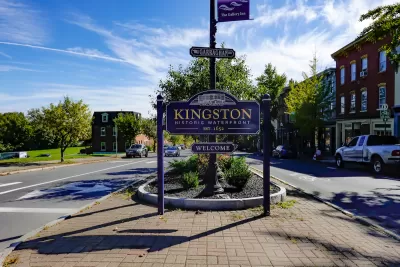Rent stabilization typically limits the amount that rent can go up every year—but a newly appointed rent guidelines board in Kingston, New York took it a step further.

Kingston, New York, a small city 90 minutes from Manhattan, has become an unexpected trailblazer in rent stabilization policy. Facing rapidly rising housing costs that saw median rents jump 46.1 percent in just a few years, Kingston took the unprecedented step of becoming the first municipality in New York outside of New York City and its neighboring counties to opt into the Emergency Tenant Protection Act (ETPA). This decision, made possible by the 2019 Housing Stability and Tenant Protection Act, allowed Kingston to implement rent stabilization measures in response to its growing housing affordability crisis.
The path to rent stabilization in Kingston highlights the crucial role of accurate data in urban policy decisions. An initial vacancy survey showing a 6.7 percent rate nearly derailed the effort, as it exceeded the 5 percent threshold required to declare a housing emergency. However, grassroots organizers pushed for a more thorough, city-conducted survey, which revealed a stark 1.57 percent vacancy rate. This finding not only enabled Kingston to proceed with rent stabilization but also exposed the severity of the city's housing shortage, challenging conventional methods of assessing housing needs.
In a move that has sent ripples through the state's housing policy landscape, Kingston's Rent Guidelines Board ordered a 15 percent rent reduction for stabilized units - the first such reduction in New York State history. The board also declared that any rent increase exceeding 16 percent between January 2019 and July 2022 constituted an overcharge, empowering tenants to seek refunds. While these decisions face ongoing legal challenges from landlord associations, they represent a significant shift in the approach to tenant protections and affordable housing policy.
See the source article to learn more about how they did it.
FULL STORY: Kingston Agreed the Rent Was Too Damn High—So It Lowered It

Alabama: Trump Terminates Settlements for Black Communities Harmed By Raw Sewage
Trump deemed the landmark civil rights agreement “illegal DEI and environmental justice policy.”

Study: Maui’s Plan to Convert Vacation Rentals to Long-Term Housing Could Cause Nearly $1 Billion Economic Loss
The plan would reduce visitor accommodation by 25% resulting in 1,900 jobs lost.

Planetizen Federal Action Tracker
A weekly monitor of how Trump’s orders and actions are impacting planners and planning in America.

Wind Energy on the Rise Despite Federal Policy Reversal
The Trump administration is revoking federal support for renewable energy, but demand for new projects continues unabated.

Passengers Flock to Caltrain After Electrification
The new electric trains are running faster and more reliably, leading to strong ridership growth on the Bay Area rail system.

Texas Churches Rally Behind ‘Yes in God’s Back Yard’ Legislation
Religious leaders want the state to reduce zoning regulations to streamline leasing church-owned land to housing developers.
Urban Design for Planners 1: Software Tools
This six-course series explores essential urban design concepts using open source software and equips planners with the tools they need to participate fully in the urban design process.
Planning for Universal Design
Learn the tools for implementing Universal Design in planning regulations.
Caltrans
Smith Gee Studio
Institute for Housing and Urban Development Studies (IHS)
City of Grandview
Harvard GSD Executive Education
Toledo-Lucas County Plan Commissions
Salt Lake City
NYU Wagner Graduate School of Public Service





























